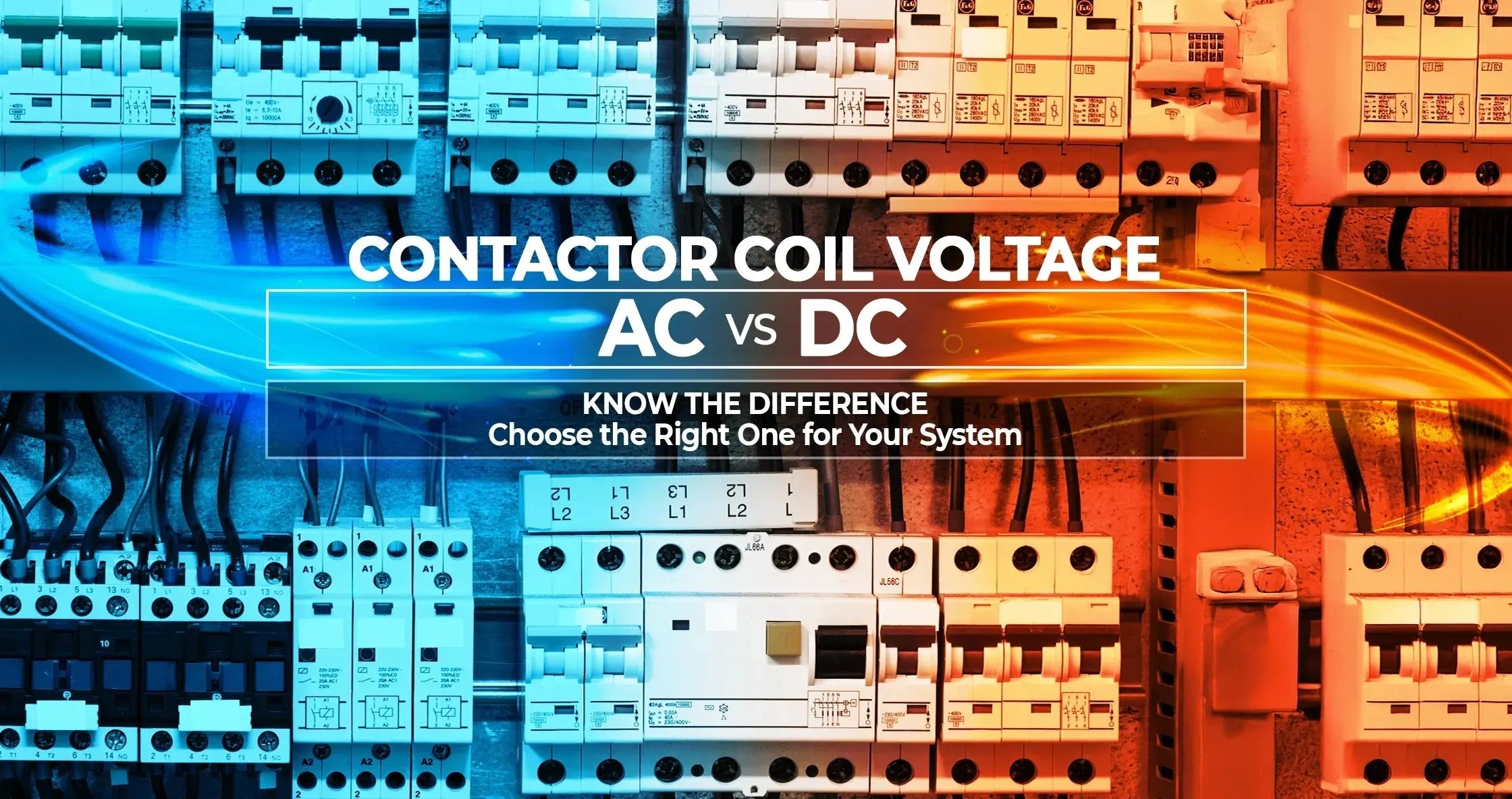When working with contactors in electrical systems, understanding the difference between AC and DC contactor coil voltage is crucial. The contactor coil voltage determines the energy source needed to energize the contactor's coil, which ultimately controls the circuit's operation. Whether you're maintaining industrial machines, building control panels, or upgrading motor control systems, choosing the right contactor coil voltage ensures performance, safety, and longevity.
What Is Contactor Coil Voltage?
A contactor is an electrically controlled switch used to manage power flow in circuits, typically for motors, lighting, heating, or capacitors. The coil inside the contactor is responsible for creating the magnetic field that pulls the contacts together. The voltage applied to this coil—known as the contactor coil voltage—can be either AC (alternating current) or DC (direct current).
The contactor coil voltage must match the control voltage available in your system. Selecting the wrong type can result in malfunction, coil damage, or inefficient operation.
AC Contactor Coil Voltage
How It Works
An AC contactor coil operates using alternating current. AC power fluctuates in polarity and magnitude, usually at 50 or 60 Hz depending on regional standards. The coil energizes by drawing current from an AC source, generating a magnetic field that pulls in the contacts.
Pros of AC Contactors
- Widely available: Most commercial and industrial systems operate on AC power.
- Cost-effective: AC coils are generally cheaper than their DC counterparts.
- Simpler wiring: AC wiring tends to be less complex in some systems.
- Built-in suppression: Many AC contactors already include arc suppression features.
Cons of AC Contactors
- Buzzing noise: Due to the alternating magnetic field, AC coils can produce humming sounds.
- Vibration and wear: The flux fluctuation may lead to mechanical wear over time.
- Inrush current: AC coils typically draw a high initial current which can cause momentary voltage drops.
Ideal Applications for AC Contactor Coil Voltage
- HVAC systems
- Commercial lighting panels
- Industrial machinery operating on three-phase AC
- General building automation systems
DC Contactor Coil Voltage
How It Works
DC contactor coils use direct current, which flows in a single direction and maintains constant polarity. Once voltage is applied, the coil produces a steady magnetic field that engages the contacts.
Pros of DC Contactors
- Quiet operation: No polarity switching means minimal humming or buzzing.
- Reduced wear: Constant magnetic flux results in less contact vibration.
- Stable actuation: Provides consistent pull-in performance.
- Low energy consumption: Typically more energy-efficient during hold-in.
Cons of DC Contactors
- More expensive: DC coils are generally costlier.
- Requires arc suppression: Contactors need to be designed to manage arcs effectively since DC arcs are harder to extinguish.
- Requires rectifiers: If your system runs on AC but needs a DC coil, you must use rectifiers.
Ideal Applications for DC Contactor Coil Voltage
- Renewable energy systems (solar, wind)
- Battery-powered control circuits
- Elevator systems
- Precision automation and robotics
- Transport systems (railways, electric vehicles)
AC vs DC Contactor Coil Voltage: A Side-by-Side Comparison
|
Feature |
AC Coil Voltage |
DC Coil Voltage |
|
Power Type |
Alternating Current |
Direct Current |
|
Noise |
Audible humming |
Silent |
|
Magnetic Field |
Fluctuating |
Steady |
|
Wear & Tear |
Higher |
Lower |
|
Cost |
Lower |
Higher |
|
Arc Suppression |
Built-in or minimal |
Required and complex |
|
Response Time |
Slower in some cases |
Faster, consistent |
Key Considerations When Choosing Contactor Coil Voltage
1. Source Voltage Availability
Always consider the type of control voltage available in your system. If your panel runs on 24V DC, using an AC coil would require additional components like transformers or inverters.
2. Environment
DC coils are ideal in noise-sensitive environments due to their silent operation. AC coils might be more suitable where cost and simplicity are priorities.
3. Response Time Requirements
For precision-driven applications like robotics or elevators, DC coils generally offer quicker and more stable actuation.
4. Safety and Arc Management
DC contactors need robust arc quenching designs due to the persistent nature of DC arcs. Make sure to verify the breaking capacity of DC-rated contactors.
5. Energy Efficiency
DC coils are often more energy-efficient in long-duration operations, making them ideal for battery-operated or off-grid systems.
Common Coil Voltage Ratings
Understanding the standard voltage ratings available helps match the coil to your system:
- AC Coil Voltages: 24V, 48V, 110V, 220V, 380V, 415V (50/60 Hz)
- DC Coil Voltages: 12V, 24V, 48V, 110V, 220V
These ratings vary slightly based on manufacturer, application, and regional standards.
Choosing Between AC and DC Contactor Coils: A Quick Guide
- Choose AC contactor coil voltage if:
- Your control system runs on AC.
- You're looking for an economical solution.
- The application does not require silent operation.
- Choose DC contactor coil voltage if:
- You need quiet operation.
- Your application runs on battery or DC grid.
- Precision, minimal wear, or consistent response is critical.
Conclusion
Understanding kis a vital step in optimizing any electrical system for reliability and performance. AC and DC coils serve different purposes and excel in different environments. While AC coils are affordable and convenient for many industrial setups, DC coils shine in precision applications and where silent, energy-efficient operation is a must.
Matching the right coil voltage to your power source and operational needs will ensure long-lasting equipment performance and minimal maintenance headaches.
Explore Related Product Collections
Looking to find the right contactor for your application? Explore our curated product collections at Industrial Electrical Warehouse:
Equip your system with quality components that match your control requirements. Shop with confidence and get expert support from our team!


